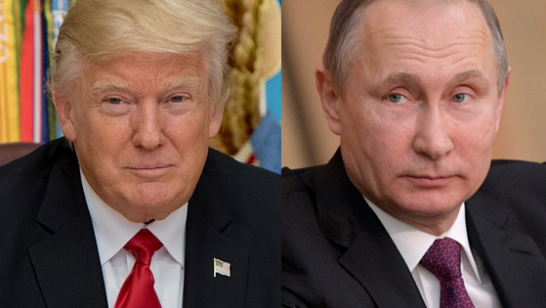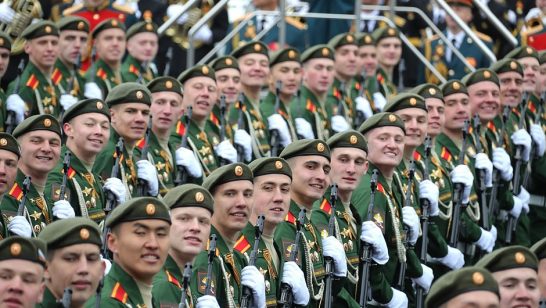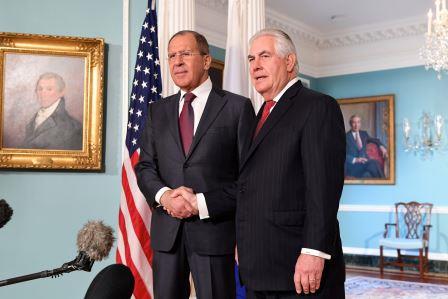
Donald Trump’s election raised expectations for change in the U.S.-Russia relationship. During the campaign, he had spoken highly of Vladimir Putin and said he would bring relations with Russia out of their post-Cold War nadir. Six months into the Trump administration, however, little has changed. Instead, the White House labors under a cloud of allegations about possible collusion between the Trump presidential campaign and Russians.
Secretary of State Tillerson quickly emerged as President Trump’s point-person on relations with Moscow. He described a step-by-step approach: try to take the edge off tensions, make progress on smaller questions, and then move to more challenging issues. He reportedly told Russian Foreign Minister Lavrov that the Ukraine-Russia conflict posed the largest impediment to restoring a more normal relationship.
Seeing no early change in Washington’s policy, and unhappy about U.S. actions such as the cruise missile strike on Syria and imposition of additional sanctions on Russia, the Kremlin nevertheless waited, investing its hopes in a face-to-face encounter between Trump and Putin. If the White House wanted an earlier meeting, in the event it held off until the G20 summit in Hamburg. That gave the U.S. president time to check important boxes, meeting the leaders of NATO, China and Ukraine before sitting down with Putin.
In Hamburg, the two presidents discussed the predicted issues: Ukraine, Syria and North Korea. Just before the meeting, Tillerson indicated a readiness to engage more actively in finding a solution to the Ukraine-Russia conflict and announced a special envoy. The presidents agreed on a ceasefire in southern Syria. Otherwise, they announced no major breakthroughs (and none was expected). Trump raised Russian interference in the U.S. presidential election, which Putin unsurprisingly denied. The presidents agreed on a joint cyber security working group.
Russian officials portrayed the meeting as a success. If nothing else, it showed that Putin had come a long way from the 2014 G20 meeting in Australia, when he left early after being pointedly snubbed by other leaders. As to election hacking, Putin and Lavrov claimed that Trump had accepted Putin’s denial. Putin said the cyber group would end “speculations” about Russian election interference.
Trump avoided a post-summit press briefing, an unfortunate decision that let Putin set the spin. White House officials were slow to contradict Russian allegations that Trump had accepted Putin’s denial of election meddling. In a post-meeting tweet, Trump himself undermined assertions that he had forcefully protested the interference.
While a working group to discuss rules of the road for cyber activities, including prohibited cyber actions, could have been useful, the working group as described by Putin made little sense. U.S. officials did not present a different view, and Trump quickly backed away from the idea.
In post-meeting press appearances, Putin subtly complimented Trump, in ways that appeared designed to appeal to the American president’s ego. That suggests the Kremlin has not given up on Trump—and that Putin may believe that he can manipulate him. (The one-on-one discussion on the margins of the G20 dinner, a discussion that the White House did not disclose until word leaked, may reinforce Putin’s belief.)
Trump returned to Washington to new revelations about his son’s contact with Russians and offers of derogatory Russian government information on Hillary Clinton. The collusion investigation will take months and continue to cast a shadow over the White House and its Russia policy. Any agreements with Moscow will come under microscopic scrutiny to determine whether they entail inappropriate concessions.
The focus on the U.S. approach toward Russia now will shift back to Tillerson. He reportedly has a three-part strategy: push back when Moscow overreaches or commits aggressive acts, cooperate where interests converge, and strengthen strategic stability. That is a sensible policy. In implementing it, Washington should consider the following steps:
- Promote contacts between Secretary of Defense Mattis and the Russian defense minister and a NATO-Russia military-to-military channel to discuss steps to avoid accident or miscalculation when NATO and Russian military units operate in close proximity in/near Europe. Neither side needs the crisis that would result from a mid-air collision between a Russian and NATO aircraft.
- Engage with Ukrainian, Russian, German and French officials on ending the Ukraine-Russia conflict in eastern Ukraine, but understand that progress requires that Moscow decide it wants a settlement, not a simmering conflict to put pressure on and destabilize Kyiv. There is no evidence that the Kremlin has made that decision. In the meantime, work with the European Union to keep the sanctions pressure on Russia.
- Continue discussions on Syria but with limited expectations. At this point, U.S. and Russian goals in that strife-torn country differ too greatly to enable major cooperation.
- Launch the strategic stability talks. Among other things, they could provide a venue for discussing ways to preserve the 1987 Intermediate-range Nuclear Forces Treaty. The talks also might address extending the 2010 New Strategic Arms Reduction Treaty for five years beyond its 2021 expiration date. That could be an early achievable, and U.S. military support for extension would insulate the White House from criticism that it was a give-away.
- Resurrect the idea of a cyber working group, but the purpose should be clearly set out as defining impermissible cyber activities, and the U.S. side should use that forum to stress that any repetition of Russia’s 2016 interference would have significant consequences.
- Restoring a more normal U.S.-Russia relationship will require patience and hard work. It will require a readiness on both sides to alter policies that have brought relations to their current low point. And it will require some deft White House management of politics in Washington. In this difficult environment, expectations for rapid progress should remain modest.
The opinions articulated above represent the views of the author(s), and do not necessarily reflect the position of the European Leadership Network or any of its members. The ELN’s aim is to encourage debates that will help develop Europe’s capacity to address the pressing foreign, defence, and security challenges of our time.



